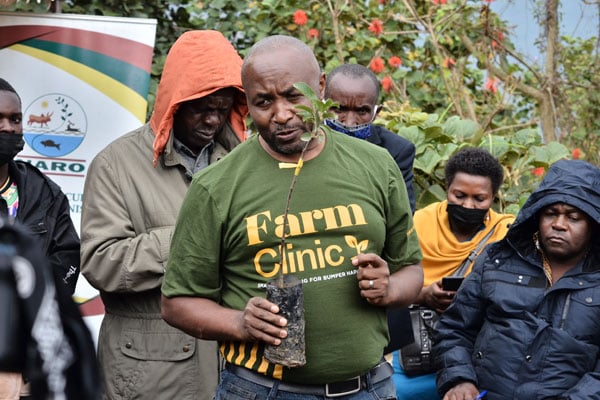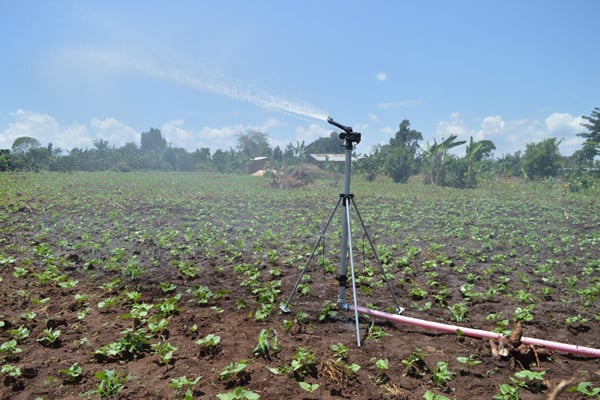Farmers learn new technologies

Denis Ashaba, a researcher at Naro Kachwekano teaches about apple growing. PHOTO / george katongole
What you need to know:
- Much as the farmers were excited about the production techniques that can enable them increase production, financing gaps are limiting many in terms of post-harvest handling, value addition and even acquiring the right production machinery.
More than 1,500 farmers attended last Saturday’s Seeds of Gold Farm Clinic at Kachwekano Zonal Research and Development institute (KaZARDI) in the highlands of Kabale District, the first version of the farmers’ day organised this year.
The farmers were eager to learn about what goes into getting maximum yields from potatoes, goats, vegetables and get interested in growing apples with sustainable land management.
Dr Alex Barekye, the Director of Research at the institute said National Agricultural Research Organisation (Naro) has a mandate of managing food security through research while promoting agro-industrialisation.
KaZARDI is one of the 16 public agricultural research institutes conducting adaptive research in Uganda’s south western highlands agro-ecological zone. Administratively, it comprises Kabale, Kisoro, Kanungu, Rukungiri, Rubanda and Rukiga districts.
After the general pleasantries, farmers were guided to Kachwekano demonstration farms to see a selection of crops and how they can benefit from them. Milton Kwesiga, an established apple farmer with 4,000 plants said this is valuable as it brings farmers up to speed with new developments and agronomic practices.
Dr Roland Agaba, a plant breeder and geneticist (crop and tree improvement Scientist), provided an overview of growing apples and answered the farmers’ questions.
Giving valuable information right from the seeding process to harvesting, Dr Agaba, said that apples can be grown in any agricultural zone with emphasis on good agronomic practices and disease management. Apples can be a good source of income on top of numerous health benefits.
Grow potatoes
Potatoes, an important crop in Kabale, is highlighted as a subject of research at the institute.
Dr Abel Arinaitwe, a research scientist in plant diseases at the institute highlighted that new varieties being developed are disease resistant and highly productive.
Talking about Naropot varieties 1-4, Dr Arinaitwe says that a farmer can harvest up to seven tonnes per acre.
“But most importantly, these varieties are resistant to the deadly late blight which creates a loss of Shs17b to the country on chemicals for spraying,” he says.
The station now has three varieties which are about to be released with an aim of meeting the current consumption trends that take into consideration fast foods such as French fries. The varieties include Sarpo UNA, Naro 2016.19 and Naro2016.24.
The clinic also focused on the commercial value of vegetables where farmers learnt that by planting nine plants of spinach in a square metre, they can be able to harvest 1.5kg every day from which they can earn about Shs6000 weekly for more than 12 months.
Solving the financial hurdle
Much as the farmers were excited about the production techniques that can enable them increase production, financing gaps are limiting many in terms of post-harvest handling, value addition and even acquiring the right production machinery.
In Uganda, access to agricultural credit by the rural community, where the majority, more than 80 percent are smallholder farmers, has remained very low stagnating in the range of 10-20 percent.
The limiting factors are many including high interest rates by commercial banks, limited financial literacy, and lack of collateral, lack of bankable projects and high risk of agricultural credit to farmers.
Samson Mwebesa, the Stanbic Bank Branch Manager Kabale explains that they offer friendly financing options across the value chain of agriculture which can interest the farmers.
Among the products Stanbic Bank offers is trade finance, a solution which supports people in the agri-business supply, commodity trade financing, term loans to farmers, insurance products and short-term loans.
Mwebesa stresses that for effective service delivery, the farmers should be organised in groups or Savings and Credit Co-operative Societies (SACCOs) to access the full benefits.
“Most of the farmers do not have collateral to access loans. The easiest way is to form farmers groups such that they get the financing. We cannot lend every farmer as very few have security,” he said.
The bank serves 23 Saccos in the region with seven large scale farmers.
But Alex Lwanja, the Bank of Uganda’s head of Agricultural Credit Facility (ACF) stressed that farmers should get interested in the government facilities. “Starting farming without a loan can be difficult,” Lwanja said.
Loans under the ACF are disbursed to farmers and agro-processors through the PFIs at more favourable terms than are usually available under conventional loans.
The maximum loan amount to a single borrower is up to Shs.2.1b. However, this amount can be increased up to Shs.5b on a case by case basis (for eligible projects that add significant value to the agriculture sector and the economy as a whole).
The interest rate is up to a maximum of 12 percent per annum with a grace period of maximum three years.
But Lwanja expressed disappointment with some banks which he said are frustrating farmers.
“We are aware that there are banks that instead tell farmers to choose their in house facilities. We have an MOU with all commercial banks and if any frustrates you, report to the Bank of Uganda and we shall follow it up from there,” Lwanja says.
Naro tips Farm Clinics
Progressive farmers should always make sure they attend as many farmers’ days such as Seeds of Gold Farm Clinic as possible. The call was made by Dr Barbara Mugwanya Zawedde, the Director Mukono ZARDI, who represented Dr Ambrose Agona, Naro’s director general at the Farm Clinic. “Not only does this reinforce the farmers’ existing knowledge, it exposes them to the latest innovations within the sector. A lot of research is being done and it can only be learnt through attending such events,” Dr Zawedde said.
NMG, which runs the Daily Monitor and NTV among other print, digital and broadcast brands, partners with Naro, Bank of Uganda, NSSF, Stanbic Bank and Zoetis, for the outreaches.




